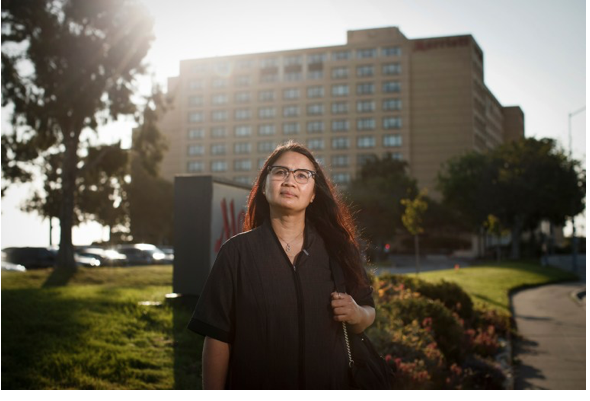CommentsSTATE OF THE UNIONS - Shirley Reyes tucked herself next to her 17-year-old son on the couch, peppering him with questions about unions as he googled the cost and benefits of collective bargaining on his phone.
Reyes, a Filipina single mother, was inquisitive — and a little anxious. Some labor representatives had already knocked on their cramped granny unit in Daly City, a majority Asian community south of San Francisco. She wondered if she was risking one of her jobs cleaning hotel rooms simply by talking to them.
Her son’s findings began to put her at ease. Unions aim to negotiate higher wages and better benefits for workers. It’s likely the surgery she had six years ago would have cost her less under union-negotiated health insurance. After months of hushed discussions at work, Reyes was handed an official secret ballot. It was a yes or no question.
Do you wish to be represented for purposes of collective bargaining by UNITE HERE Local 2?
It’s a question a vast number of California workers, a third of whom make $15 an hour or less, haven’t had the opportunity to answer. Union participation is at historic lows and collective bargaining is less prevalent in retail, restaurants and hotels — segments of the private sector with high concentrations of low-wage jobs.
California wants to change that. The Future of Work Commission, convened by Democratic Gov. Gavin Newsom to think of moonshot goals for lifting millions of working Californians out of poverty, proposed getting more workers represented as part of the solution for stemming the state’s staggering wage gap. The commission, which included labor and business leaders, asserted in their final report released earlier this year that while a college degree reduces the chance of a low-wage job by 33%, union membership improves those odds by 39%. That could go a long way in a state where one in three households with working adults struggle to afford basic necessities, while the top 2% control 20% of the wealth.
The commission urges employers and employees to reach agreement on a new social compact that would foster quality jobs over the next decade. But first that requires building consensus around basic principles of giving workers a greater voice, whether through unions or worker organizations.
That hasn’t happened yet.
Diminished voices
The rapid growth of high-skilled tech jobs and the loss of industrial jobs to global labor markets have significantly widened the gap between rich and poor. At the same time, worker organization has diminished. The share of California workers in a union has steadily declined from about 40% in the 1950s to 16% last year.
Union participation is especially poor in the private sector, which makes up 84% of the state workforce. Today, 1 in 10 private-sector
workers belong to a union, compared to 1 in 2 in the public sector.
Yet these private-sector workers are most in need of a voice.
Numerous reports have documented the pandemic’s disproportionate impact on essential workers, many of whom are immigrants and women of color. Many of the working poor are employed in the service economy, such as retail, hospitality and tourism. They are the ones making and delivering food, producing and packaging goods, and cleaning and caring for others but unable to keep up with their own bills.
For Reyes, who works at the Marriott Waterfront, voting yes to a union worked out for the better. After the contract was signed Aug. 4, Reyes’s wage will rise from $19.80 to $24.30 over the next year. Her health insurance premium dropped from $250 a month to $35. Dental insurance and the option of a 401(k) or pension plans were added.
(Grace Gedye covers California’s economy for CalMatters. Previously, she was an editor at the Washington Monthly. She is a graduate of Pomona College.)
(Jesse Bedayn reports on economic inequality for The Mercury News in San Jose and CalMatters as part of The California Divide project. Before becoming a Report for America corps member, Bedayn studied investigative reporting and narrative writing at UC Berkeley’s Graduate School of Journalism, where he wrote about health care and aging in California and investigated the fraught world of for-profit nursing homes for the Investigative Reporting Program. Bedayn has worked as a stringer for The New York Times and as a research and data assistant at KQED public radio where he plumbed through police use-of-force cases.)





